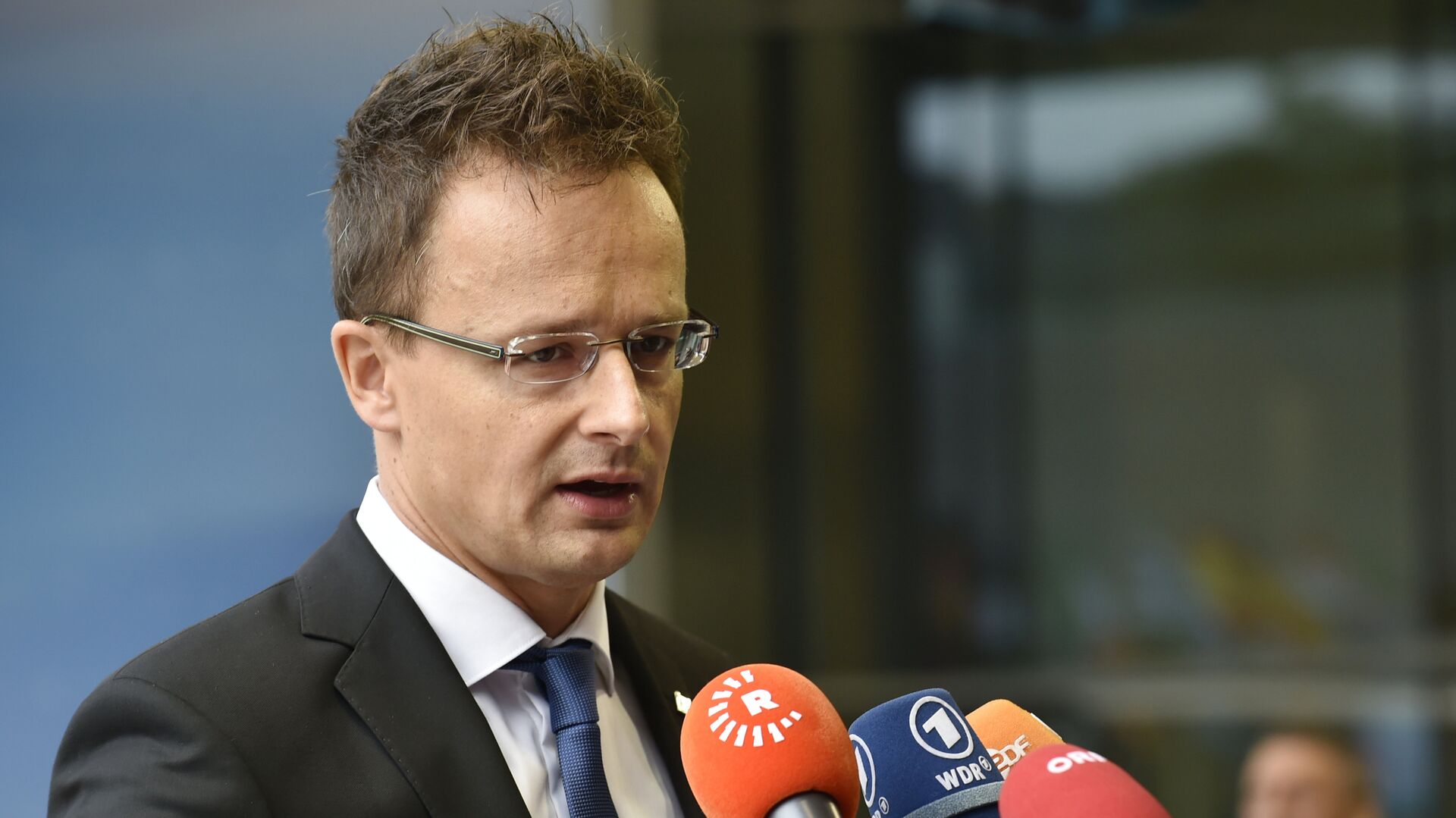https://sputnikglobe.com/20221209/hungarys-szijjarto-says-brussels-using-all-kinds-of-blackmail-against-budapest-1105259708.html
Hungary's Szijjarto Says Brussels Using All Kinds of Blackmail Against Budapest
Hungary's Szijjarto Says Brussels Using All Kinds of Blackmail Against Budapest
Sputnik International
BUDAPEST (Sputnik) - Hungary must be prepared for serious attacks from the European Union since "Brussels and liberal propaganda machine" are not selective in... 09.12.2022, Sputnik International
2022-12-09T02:52+0000
2022-12-09T02:52+0000
2022-12-09T02:52+0000
world
hungary
viktor orban
budapest
peter szijjarto
https://cdn1.img.sputnikglobe.com/img/102721/05/1027210590_0:0:4317:2428_1920x0_80_0_0_d49d0e18d327de578441272bbf3f3b4d.jpg
The minister recalled that over the past 12 years, Budapest's anti-crisis policy has never been "in the mainstream" of the EU, "but it has always been successful." Hungary has built fences on the southern border when it was required to accept migrants, purchased COVID-19 vaccines from Russia and China when the EU was waiting for Western-made vaccines, and now advocates a peaceful resolution of the conflict in Ukraine, Szijjarto said.The minister reiterated that Budapest's goal was to avoid a recession at a time when "the energy crisis on a scale never seen before has arisen in Europe."The conditionality regime, which came into force in January 2021, is a tool to protect EU funds from being misused by member states that do not adequately uphold the rule of law. It works by withholding EU funding from delinquent states. Hungary is the first country to have fallen foul of this mechanism.On November 24, Hungarian Prime Minister Viktor Orban said Budapest had fulfilled the entire list of requirements agreed upon with the European Commission. The prime minister expected that at the Commission's meeting on November 30, a decision would have been made to unfreeze the Hungarian part from EU funds. In general, the European Commission's requirements concerned measures to combat corruption, increase transparency of public procurement, and strengthen the independence of the judicial system.On November 30, the Commission decided to maintain its initial proposal of September 18 to freeze 7.5 billion euros ($7.8 billion) in EU budget funding for Hungary until Budapest fulfills all its conditions. Now the Commission's decision must be approved by the Council of EU countries by a qualified majority. Hungarian EU Affairs Minister Tibor Navracsics attributed this decision to the fact that part of Budapest's obligations, according to the schedule, will be fulfilled later and expressed hope that the country will receive 100% of the funds in 2023.On December 2, Orban said the EC continues to block EU funds allocated to Hungary to influence the country's position on migration, sexual education, and sanctions, but Budapest has no intention of changing its stance.
hungary
budapest
Sputnik International
feedback@sputniknews.com
+74956456601
MIA „Rossiya Segodnya“
2022
Sputnik International
feedback@sputniknews.com
+74956456601
MIA „Rossiya Segodnya“
News
en_EN
Sputnik International
feedback@sputniknews.com
+74956456601
MIA „Rossiya Segodnya“
Sputnik International
feedback@sputniknews.com
+74956456601
MIA „Rossiya Segodnya“
hungary, viktor orban, budapest, peter szijjarto
hungary, viktor orban, budapest, peter szijjarto
Hungary's Szijjarto Says Brussels Using All Kinds of Blackmail Against Budapest
BUDAPEST (Sputnik) - Hungary must be prepared for serious attacks from the European Union since "Brussels and liberal propaganda machine" are not selective in their means and are using all kinds of blackmail against Budapest, Hungarian Foreign Minister Peter Szijjarto said on Thursday.
The minister recalled that over the past 12 years, Budapest's anti-crisis policy has never been "in the mainstream" of the EU, "but it has always been successful." Hungary has built fences on the southern border when it was required to accept migrants, purchased COVID-19 vaccines from Russia and China when the EU was waiting for Western-made vaccines, and now advocates a peaceful resolution of the conflict in Ukraine, Szijjarto said.
"Currently, there is practically no kind of blackmail that Brussels has not resorted to against Hungary... We have always been attacked, attacked fiercely, but in the end, we have always been right. In the period to come, of course, we have to prepare ourselves for future serious attacks. Brussels and the international liberal propaganda machine clearly will not choose the means. Money blackmail, political blackmail, spreading fakes and lies will follow," Szijjarto told the Civic Solidarity Forum.
The minister reiterated that Budapest's goal was to avoid a recession at a time when "the energy crisis on a scale never seen before has arisen in Europe."
The conditionality regime, which came into force in January 2021, is a tool to protect EU funds from being misused by member states that do not adequately uphold the rule of law. It works by withholding EU funding from delinquent states. Hungary is the first country to have fallen foul of this mechanism.
On November 24, Hungarian Prime Minister Viktor Orban said Budapest had fulfilled the entire list of requirements agreed upon with the European Commission. The prime minister expected that at the Commission's meeting on November 30, a decision would have been made to unfreeze the Hungarian part from EU funds. In general, the European Commission's requirements concerned measures to combat corruption, increase transparency of public procurement, and strengthen the independence of the judicial system.
On November 30, the Commission decided to maintain its initial proposal of September 18 to freeze 7.5 billion euros ($7.8 billion) in EU budget funding for Hungary until Budapest fulfills all its conditions. Now the Commission's decision must be approved by the Council of EU countries by a qualified majority. Hungarian EU Affairs Minister Tibor Navracsics attributed this decision to the fact that part of Budapest's obligations, according to the schedule, will be fulfilled later and expressed hope that the country will receive 100% of the funds in 2023.
On December 2, Orban said the EC continues to block EU funds allocated to Hungary to influence the country's position on migration, sexual education, and sanctions, but Budapest has no intention of changing its stance.


